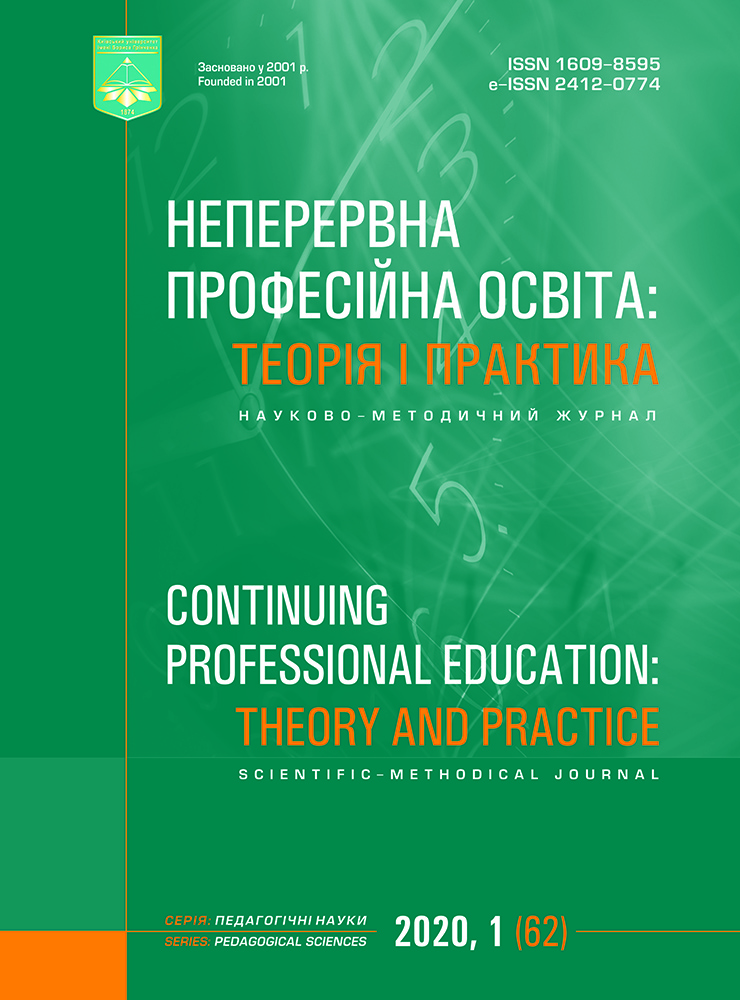INCREASING MOTIVATION IN PHYSICAL EDUCATION CLASSES AT AN AGRARIAN UNIVERSITY
DOI:
https://doi.org/10.28925/1609-8595.2020.1.4Keywords:
agricultural university, educational process, pedagogical competence of the scientific and pedagogical worker of physical education, scientific and pedagogical worker of physical education methodological work, structure of pedagogical competenceAbstract
This article defines the criteria for the formation of the pedagogical competence of scientific and pedagogical workers in physical education (motivational-value, cognitive-processual, developmental, educational, health-saving, communicative), their structure, content and measurement methods are disclosed. The determination of the components of the pedagogical competence of scientific and pedagogical workers of physical education makes it possible to significantly expand the range of pedagogical knowledge, skills and abilities of scientific and pedagogical workers of physical education, as well as to carry out their diagnostics as a kind of reference point for the content of the methodological work of the model of the educational process, which will help to adjust the process of development of pedagogical competence scientific and pedagogical workers of physical education in the methodological work of an agricultural university.
Physical education in an agrarian institution of higher education is aimed at solving the following specific tasks: formation of high moral, strong-willed and physical qualities of the learners of higher education, readiness for highly productive work; students’ health protection and promotion, promotion the all-round development of the body, maintaining high performance throughout the study period; comprehensive physical training; vocational-applied physical training of higher education learners, taking into account the features of future employment; gaining the necessary knowledge of the fundamentals of theory, methodology, and organization of physical education and sports training, preparation for work as public instructors, coaches and judges; improving the athletic skills of higher education athletes; nurturing awareness of the need to regularly exercise in physical culture and sports
References
Bondarenko, T. E. (2012). Vyznachennya struktury zdorovyazberigauchoi kompetentnosti maibutnih vchyteliv biologii [The definition of health-keeping competence’s structure of future biology teachers]. Pedagogichni nauky: teoriya, istoriya, innovaciyni tehnologii, 1 (19), 214–223.
Buhalska, S. E. (2012). Obgruntuvannya strustury pedagogichnoi kompetentnosti vykladacha medychnogo koledzhu [Substantiation of the structure of pedagogical competence of the medical college teacher]. Pedagogichnyi proces: teoriya i praktyka, 2, 5–12.
Golovatuy, M. F. (2005). Navchu sebe sam [Teach Yourself]. MAUP.
Holovan, M. S. (2014). Profesiyna kompetentnist vykladacha vyschogo navchalnogo zakladu [Professional competence of a teacher of higher education]. Problemi suchasnoyi pedagogichnoyi osviti. Seriya: Pedagogika i psihologiya, 44 (3), 79–88.
Gurzhiy, A. M. (2015). Formuvannya profesiynoi kompetentnosti maibutnih uchyteliv trudovogo navchannya zasobamy informaciyno-komunikaciynyh tehnologiy: monografiya [Formation of professional competence of future teachers of labor training by means of information and communication technologies: monograph]. Planer.
Derbenyova, A. G. (2012). Use pro motyvaciu [It’s all about motivation]. Osnova.
Zaznuk, S. S. (2002). Psyhologiya motyvacii [Psychology of motivation]. Lybid.
Krupa, V. V. (2013). Pedagogichni umovy formuvannya profeciynoi kompetentnosti maibutnih fahivciv fizuchnoi reabilitacii [Pedagogical conditions of formation of professional competence of future specialists of physical rehabilitation]. Naukovyi visnyk Uzhgorodskogo nacionalnogo universytetu, 27, 93–96.
Krucevych, T. U. (2008). Fizychne vyhovannya yak socialne yavysche [Physical education as a social phenomenon].
In Teoriya i metodyka fizychnogo vyhovannya (pp. 27–46). Olimpiyska literatura.
Matvienko, L. I. (2013). Robocha programa navchalnoi dyscypliny «Psyhodiagnostika» dlia studentiv za napriamom pidgotovky 6.030102 «Psyhologia» [Work program of the discipline «Psychodiagnostics» for students in the field of preparation 6.030102 «Psychology»]. http://ipk-dszu.kiev.ua/manuals/%.
Noss, I. N. (2011). Psyhodiagnostyka [Psychodiagnosis]. Urait.
Osadchaia, T. U., Maksimenko, I. G. (2008). Fizicheskoe vospitanie shkolnikov v USA [Physical education of schoolchildren in the USA]. Olimpijskaya literaturа.
Piontkovskiy, D. V. (2008). Formuvannia vmin samovdoskonalennia studentiv u pozaaudytorniy diyalnosti z fizychnogo vyhovannia: teoretyko-metodychnyi aspect [Formation of students’ self-improvement skills in extracurricular physical education activities: theoretical and methodical aspect]. Visnik Zhitomirskogo derzhavnogo universitetu imeni Ivana Franka, 42, 140–144.
Podlasyi, I. P. (2001). Pedagogika: 100 voprosov – 100 otvetov [Pedagogy: 100 questions – 100 answers]. VLADOS-PRESS.
Rean, A. A. (2004). Psyhologia lichnosti Socializacia, povedenie, obschenie [Personality Psychology. Socialization, behavior, communication]. Prajm-EVROZNAK.
Raevskiy, R. T. (2008). Fizicheskoe sovershenstvovanie studencheskoy molodezhy v XXI veke: strategia, problemy i puti ih reshenia [Physical improvement of student youth in the 21st century: strategy, problems and ways of solving them]. Teoriya i praktika fizichnogo vihovannya. Specialnij vipusk za materialami Mizhnarodnoyi naukovo-praktichnoyi konferenciyi «Zdorov’ya i osvita: problemi ta perspektivi». DonNU, 145–151.
Rogov, E. Y. (2004). Nastolnaya kniga prakticheskogo psihologa [Practical psychologist’s book]. VLADOS.
Sudareva, N. S. (2011). Formufannya profesiynoi kompetentnosti maibutnih fahivciv oz sportuvno-ozdorovchogo turyzmu u vyschyh navchalnyh zakladah [Formation of professional competence of future specialists in sports and health tourism in higher educational establishments]. Extended abstract of candidate’s thesis: 13.00.04.
Downloads
Published
How to Cite
Issue
Section
License
Copyright (c) 2020 Natalia Petrenko

This work is licensed under a Creative Commons Attribution-NonCommercial 3.0 Unported License.



